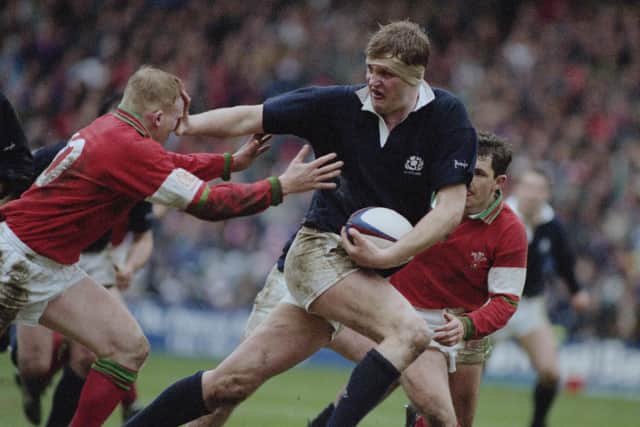Doddie Weir death: Tributes to former British & Irish Lions rugby player and MND campaigner who died aged 52
and live on Freeview channel 276
Former Scotland international rugby player Doddie Weir died on Saturday (November 26) at the age of 52, six years after he was diagnosed with motor neurone disease (MND). Born in Edinburgh, Weir raised millions through a charity he set up with his wife, My Name’5 Doddie Foundation to aid research into MND following his diagnosis in 2016.
The lock forward won 61 caps between 1990 and 2000 for Scotland, including two in one World Cup against the All Blacks - the only Scot to achieve the feat. He is survived by his wife Kathy and sons Hamis, Angus, and Ben. In a moving tribute, his wife described her husband as “an inspirational force of nature.”
Advertisement
Hide AdAdvertisement
Hide AdShe wrote: "We are lucky to have shared our lives with him and we cherish all those memories: his love and warmth, his support and advice, his quick wit, and his terrible jokes. It is difficult to put into words how much we will miss him.
"MND took so much from Doddie, but never his spirit and determination. He battled MND so bravely, and whilst his own battle may be over, his fight continues through his foundation, until a cure is found for all those with this devastating disease. Hamish, Angus, Ben and I would like to thank everyone for your support and for respecting our privacy at this difficult time."
Weir was also picked for the British and Irish Lions’ tour of South Africa in 1997 and played for Stewart’s Melville and Melrose, where he won six championships, before turning out for Newcastle and Border Reivers in the professional era. His first Scotland cap came against Argentina in November 1990.
A lineout specialist, he scored four international tries across his career, including two against New Zealand in a quarter-final loss at the 1995 World Cup. In 2019, he received an OBE from the Queen and won the BBC Sports Personality of the Year Helen Rollason Award for outstanding achievement in the face of adversity.
Advertisement
Hide AdAdvertisement
Hide Ad‘Doddie enjoyed a full life full of fun and love’
Tributes have since poured in for Weir, with many describing him as ‘inspirational’. Jill Douglas, CEO of My Name’5 Doddie Foundation and close friend said: “Doddie enjoyed a full life full of fun and love. And it was this approach to life which shone through in his determination to make a difference and help others when he was diagnosed with motor neuron disease.
"He inspired us every day with his positivity and energy and was fully committed to the work of the Foundation he launched with his close friends in November 2017. My Name’5 Doddie Foundation continues to shine a light on MND and the need to seek meaningful treatments and one day, a cure for this devastating disease."


Earlier this month, he appeared at Edinburgh’s Murrayfield with the match ball before Scotland’s match against New Zealand, receiving a standing ovation from the sold-out crowd. The sporting icon appeared for his final Scotland match in March 2000 when they lost to France 16-28 at home. Upon retirement, he and Kathy raised their children and ran a farm outside Melrose, Roxburghshire, near where he was brought up in Cortleferry.
And on Saturday night (November 26) fans at the Autumn Nations international between England and South Africa broke out in a round of applause when Doddie’s death was announced on screens around Twickenham to pay their respects. Former rugby star Scott Hastings said: “We lost the most lovable man in the world today. Doddie Weir, we will honour your legacy and find a cure for MND.”
Advertisement
Hide AdAdvertisement
Hide AdWhat is motor neurone disease?
Motor neurone disease (MND) affects the brain and nervous system causing weakness which gets worse over time. According to the NHS: “MND can significantly shorten life expectancy and, unfortunately, eventually leads to death.” While there are treatments to help control symptons, there is currently no cure for the condition. It usually affects people in their 60s and 70s, but it can affect anyone.
Symptoms begin gradually and can include things like weakness in the legs, slurred speech, a weak grip, muscle cramps and twitches, weight loss and even finding it harder to stop yourself crying or laughing in inappropriate situations. For more information on MND, visit the NHS website.
Comment Guidelines
National World encourages reader discussion on our stories. User feedback, insights and back-and-forth exchanges add a rich layer of context to reporting. Please review our Community Guidelines before commenting.
